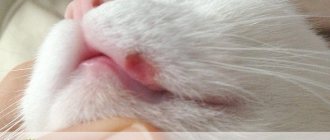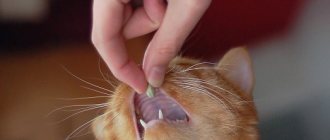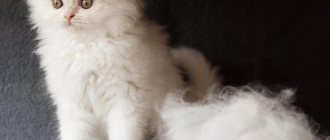Everyone has to clean their apartment or house. And most often a vacuum cleaner helps us with this. However, those who have cats in the house notice that they do not like this method of cleaning. Moreover, having seen this device in its field of vision, the animal strives to run away from it as far as possible. But not all cats are so afraid of the vacuum cleaner. There are those who treat him more or less calmly. But this is rather a rare exception to the rule.
How can you tell if your cat is afraid of the vacuum cleaner?
This can be determined by the main signs of fear:
- dilation of the pupils of the eyes;
- tousled fur;
- attempts to hide in a secluded place;
- the desire to escape from the room where the device is turned on;
- if you want to calm the animal and pick it up, it may bite and scratch;
- the pet may hiss and meow loudly;
- the desire to run out of an apartment or house through an open door or an open window.
What to do?
Many owners want to wean their pets from the fear of the vacuum cleaner, but do not know how to do it correctly. There are a few simple tips to help people get cats accustomed to loud noise from electrical appliances:
- It is best to store the vacuum cleaner in an open place accessible to the cat (you can even temporarily place the animal’s bowls with food and water next to the electrical appliance). This is necessary so that the animal, in a calm environment, can approach the object of its fear, examine it and sniff it. Once the cat gets used to the household appliance, it will begin to respond more adequately to it during cleaning.
- When turning on the vacuum cleaner, you need to select the lowest power and only gradually increase it to the maximum. It is best to turn on the device for just a couple of minutes at first. This is necessary so that the cat gets used to quiet noise and calmly perceives louder sounds.
- You should not turn on the vacuum cleaner when your pet is sleeping peacefully on its bed or on the sofa. During sleep, the animal is in a relaxed state and does not expect a trick. If at this moment the owner starts vacuuming the floor, the cat may experience severe panic, which can turn into chronic stress.
- In order not to bring the cat to nervous exhaustion, the owner must, before cleaning (even before turning on the buzzing unit), give him the opportunity to leave the room and hide in any secluded place. If you turn on the vacuum cleaner while the fearful pet is still in the room, the animal may become even more frightened, which means it will not be possible to establish contact with the household appliance.
- You need to gradually accustom your animal to a vacuum cleaner. However, it is best to do this when the kitten is still very young. It will be much easier for a young animal than for an adult cat with its own character traits and habits to get used to a noisy object.
- If the animal cannot get used to a loud, vibrating household appliance, the owner needs to think about changing the vacuum cleaner. The stores offer a wide selection of similar household appliances, including very compact and almost silent models.
Reasons why cats are afraid of vacuum cleaners and other household appliances
There are objective reasons why animals are so afraid of a vacuum cleaner:
- The appliance is too loud. The fact is that a cat’s hearing is heightened. It is three times higher than that of humans. Therefore, the sounds that this scary machine makes are completely unacceptable for your four-legged friend. They frighten him with their volume. Imagine if you heard a vacuum cleaner making noise three times louder than it does now. You wouldn't like it either.
- The vacuum cleaner scares the pet with its very appearance. The car itself is just the size of a cat. She is even slightly larger than your pet. He is frightened by the dimensions and appearance of this device. The cat perceives this device as a real monster or monster. In addition, the animal does not understand why it is needed at all, and why the owner periodically uses it. The pet's reaction is comparable to the reaction of a person who happened to meet an alien. It's scary because you don't know what to expect from this unknown creature.
- The danger comes from the vibrations that come from the vacuum cleaner. A cat can sense an earthquake or other impending disaster. They have sensitive areas of the body for this - whiskers and special receptors on the pads of their paws. Thanks to them, they sense even minor fluctuations in the environment. The pet picks up vibrations from a running machine and perceives this as a signal of a threat.
- The fear arose through the fault of the owner. A person could turn on the vacuum cleaner when the pet was sleeping. The roar suddenly woke up the animal; from surprise and fear, it might not have had time to run away and hide. Careless handling of the pet is also possible. The owner might try to vacuum the cat as a joke. Under no circumstances should this be done. Such severe stress causes harm to the body. Also, you should never suddenly scare an animal on purpose.
Increased seismic sensitivity
Almost all animals, including cats, have the ability to predict various natural disasters: earthquakes, tsunamis, volcanic eruptions. The mustachios are warned of impending danger by their amazing talent of feeling even the faintest vibrations with their paw pads. Therefore, the strong vibrations generated by a running vacuum cleaner motor cause the cat almost the same suffering as a loud sound. Oscillatory movements transmitted along the surface of the floor trigger the instinct of self-preservation, prompting the pet to immediately flee to a safe place.
How to train a cat to use a vacuum cleaner
There are several ways to train your cat to use a vacuum cleaner:
- Place the turned off machine in the middle of the room. Let your pet get to know him, sniff him. Over time, he will get used to the appearance of the vacuum cleaner and understand that there is no need to be afraid of it.
- After a few days, the pet will get used to the device. Then you can turn it on, but for a short time - 5-10 seconds and at the lowest power. And then, turning it off, let your pet make sure that nothing bad happened.
- You can put something tasty for the cat next to the non-working appliance. She first makes sure that no one is interfering with her food. And only then will he start eating the treat.
- When your four-legged friend gets used to a vacuum cleaner not working at full power, you can increase it to the maximum.
- During the process of getting used to it, it is better to show what this device is for. To do this, one person vacuums, and the second sits with the pet in his arms and calmly strokes it, calming it down.
- If the animal is still afraid of the vacuum cleaner, it is better to take it to another room before starting cleaning. And the device itself is not turned on at full power.
- Never turn on the vacuum cleaner if your pet is sleeping, eating, or fidgeting in its litter box. And don't try to force your cat closer to a running machine. This will only scare the animal even more.
Visual perception
In the mind of a cat, such a bulky and incomprehensible object as a vacuum cleaner is associated with a terrible monster that can attack at any moment and cause serious harm. And when this noisy, roaring object with a long hose begins to move around the apartment, the animal begins to really panic. The only goal of a furry pet at such moments is to hide as far as possible and not crawl out until the minute this mechanical enemy stops working and disappears from sight.
Reasons that make a cat tremble at the sight of a vacuum cleaner
A cat is, first of all, an animal that cannot properly assess the degree of danger posed by a vacuum cleaner. This is a completely normal reaction when a pet, when the device is turned on, goes wild and will not come out of its hiding place until the danger has passed. In fact, there are many reasons why a cat perceives a vacuum cleaner as a malicious enemy:
- Sound. According to their natural abilities, cats have rather fine hearing, which is much more sensitive than humans. With their ears, cats can not only hear the finest squeak or rustle, but even accurately recognize the specific place from which this sound is emitted. With the help of hearing, which nature generously endowed mustachioed pets with, they can hunt without the organ of vision, focusing only on sound sensations. The sound of a working vacuum cleaner creates a colossal vibration on the eardrums. This is not only scary, but even painful for the pet, and sometimes leads to temporary loss of orientation in space. The loud sound of a working device can give a cat a headache. As a result, the animal panics.
- Touch. Cats have developed so-called seismic hearing, that is, they hear not only with their ears, but also with the tips of their paws. At the tips of cats' paws there are special receptors and vibrations that transmit even minor vibrations to the brain. Catching oscillatory movements helps the cat sense the approach of disasters such as an earthquake or hurricane. A working vacuum cleaner creates a considerable amplitude of vibrations, which the cat perceives as a danger signal. The vibration emitted by the device encourages the animal to leave the danger zone.
- Vision. You can try to imagine what a vacuum cleaner looks like from the cats' point of view. A sort of strangely shaped thing that moves around the room with a terrible noise. He has already walked over the sofa, and his favorite lounger, and the chair in which it is so comfortable to lie. It is unknown how this thing will behave in the next minute. We need to do our legs.
- Another reason is an allergic reaction to dust. Some cats may experience such problems. This is especially true for those types of vacuum cleaners that not only suck in dust poorly, but even spit it back into the room. In this case, the cat leaves the room sneezing.
- Misbehavior of the owner. All of the above signs indicate that Murka has nothing special to love about a vacuum cleaner. Moreover, if some owners do not behave quite correctly. Unfortunately, there are such caring owners who, for the sake of a joke, put their pet in this “monster”. Indeed, after such human behavior, it will be extremely difficult to make friends with an animal with a vacuum cleaner.
What else are cats afraid of?
Cats are afraid of a lot of things, but their main fear is noise.
Our beloved furry creatures are quite timid creatures, and they are afraid of many things. Here is a sample list of what might scare your pet:
- Loud noise is the first thing that scares cats. This applies not only to the vacuum cleaner, but also to other devices that produce it, such as a home processor, hair dryer, drill, and even powerful sounds from what is happening outside the window.
- In addition, cats can be frightened by strangers. The reason is that from an early age they are exclusively with the owner, and they are either not used to new meetings or have negative experience (for example, if the kitten was offended). Therefore, the animal may not perceive friends coming to visit you in the best way. Sometimes a cat's aggressive behavior can be explained by simple jealousy.
- Cats are afraid of other animals. Their first enemy is a dog, but ferrets, chickens or geese, and even other felines can also cause fear.
- Fluffy pets do not perceive movements well. We've already mentioned that riding in a car can be very frightening for them. They also do not like closed spaces, such as elevators.
- Cats don't like the cold either. Despite the warm fur coat, it is unlikely that any cat will want to stay in the cold for a long time. They tolerate heat much easier.
- Everyone also knows that cats are afraid of water. Those who have ever bathed an animal know this firsthand.
Do you know why cats sleep on people's feet and on people's feet?
Many owners have cats that love to climb on tables. Find out how you can stop your cat from climbing on tables.
Thus, you can train your cat to use a vacuum cleaner. But what to do if you have already tried all the methods and nothing has brought results. Then you can simply lock the cat in another room while cleaning or, if possible, send it for a walk outside.










